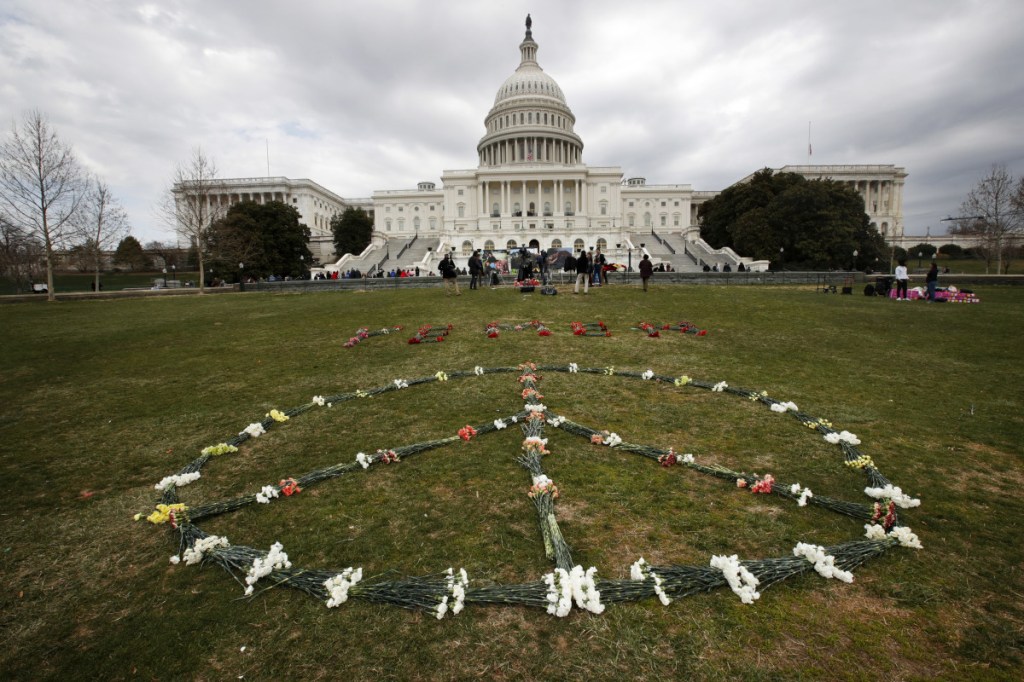Crown Prince Mohammed bin Salman, the heir to the throne of Saudi Arabia, visited Washington this week and received a rapturous welcome from President Trump, who gushed about the benefits of selling more U.S.-made weapons to the kingdom. But at the opposite end of Pennsylvania Avenue the focus was on what Saudi Arabia’s existing military might has wrought in Yemen: a humanitarian disaster in which the U.S. has been complicit.
The Senate took up a bipartisan resolution Tuesday that called for the withdrawal of U.S. military support for the Saudi-led bombing campaign aimed at Houthi rebels in Yemen, in which thousands of civilians, including many children, have been killed and millions have been displaced. Rather than approving the measure, however, senators sent it to the Senate Foreign Relations Committee to be considered as part of an examination of U.S. military activities around the world.
Yet even senators who opposed the legislation have expressed concern about the horrific effects of the Saudi-led campaign, which the U.S. has assisted by refueling Saudi fighters and supplying intelligence and advice – including, the administration says, recommendations about how to avoid civilian casualties. Senate Foreign Relations Committee Chairman Bob Corker, R-Tenn., who led the effort to table the resolution, said that in a meeting with Prince Mohammed, members of Congress “strongly, strongly pushed back on what is happening right now in Yemen and asked (the Saudis) to take strong corrective actions.”
RELUCTANCE TO RATTLE ALLY AGAINST IRAN
Sadly, there was no comparable public expression of concern from Trump, though the White House said that the president and the Saudi crown prince “discussed additional steps to address the humanitarian situation and agreed that a political resolution to the conflict is ultimately necessary to meet the needs of the Yemeni people.”
Trump’s reluctance to criticize Saudi Arabia publicly isn’t surprising. He sees the kingdom not only as a customer for “the finest military equipment anywhere in the world,” but also as a bulwark against Iran (which supports the Houthis) and even as a potential partner in a revived Israeli-Palestinian peace process. Moreover, the administration regards the 32-year-old Mohammed as a modernizer and an opponent of religious extremism.
Even so, the president should have publicly expressed concerns about the Saudis’ scorched-earth tactics in Yemen, which have included not only a relentless bombing campaign, but a blockade of ports imposed last year after a Houthi missile struck Saudi Arabia. The blockade, which was eventually relaxed, made it impossible for food, water and fuel to come into the country.
Ensuring that Saudi Arabia is more sensitive to the humanitarian consequences of its campaign isn’t just wise policy; it’s the law. The 2018 National Defense Authorization Act requires the administration to report on the extent to which Saudi Arabia and its coalition partners are taking steps to reduce the risk to civilians and facilitate the flow of aid and goods into Yemen.
To be fair, Trump did issue a statement in December instructing his administration to urge the Saudis to allow food, fuel, water and medicine to reach “the Yemeni people who desperately need it.” But, amid concerns that food is still not getting through, he needs to keep up the pressure on Saudi Arabia, publicly as well as privately, to permanently end the blockade and take affirmative steps to prevent a famine.
PRESSURE TOWARD NEGOTIATIONS OVERDUE
The administration also should be using its leverage with Saudi Arabia to promote negotiations toward a political settlement in Yemen in which the Houthis would play some part in the government while distancing themselves from Iran. After three years, the Saudi-led military campaign hasn’t succeeded in suppressing the Houthi opposition even as it has inflicted misery on innocent Yemenis. Another approach is overdue.
In opposing the Senate resolution, the administration insisted that restricting U.S. support for the Saudis would backfire. Secretary of Defense James Mattis warned that cutting off support “could increase civilian casualties, jeopardize cooperation with our partners on counterterrorism and reduce our influence with the Saudis – all of which would further exacerbate the situation and humanitarian crisis.”
For now, that view has carried the day. But if the Trump administration doesn’t use its influence with Saudi Arabia to help stop the suffering in Yemen, Congress should use its power over the federal purse to send the Saudis a message of its own.
Send questions/comments to the editors.



Comments are no longer available on this story